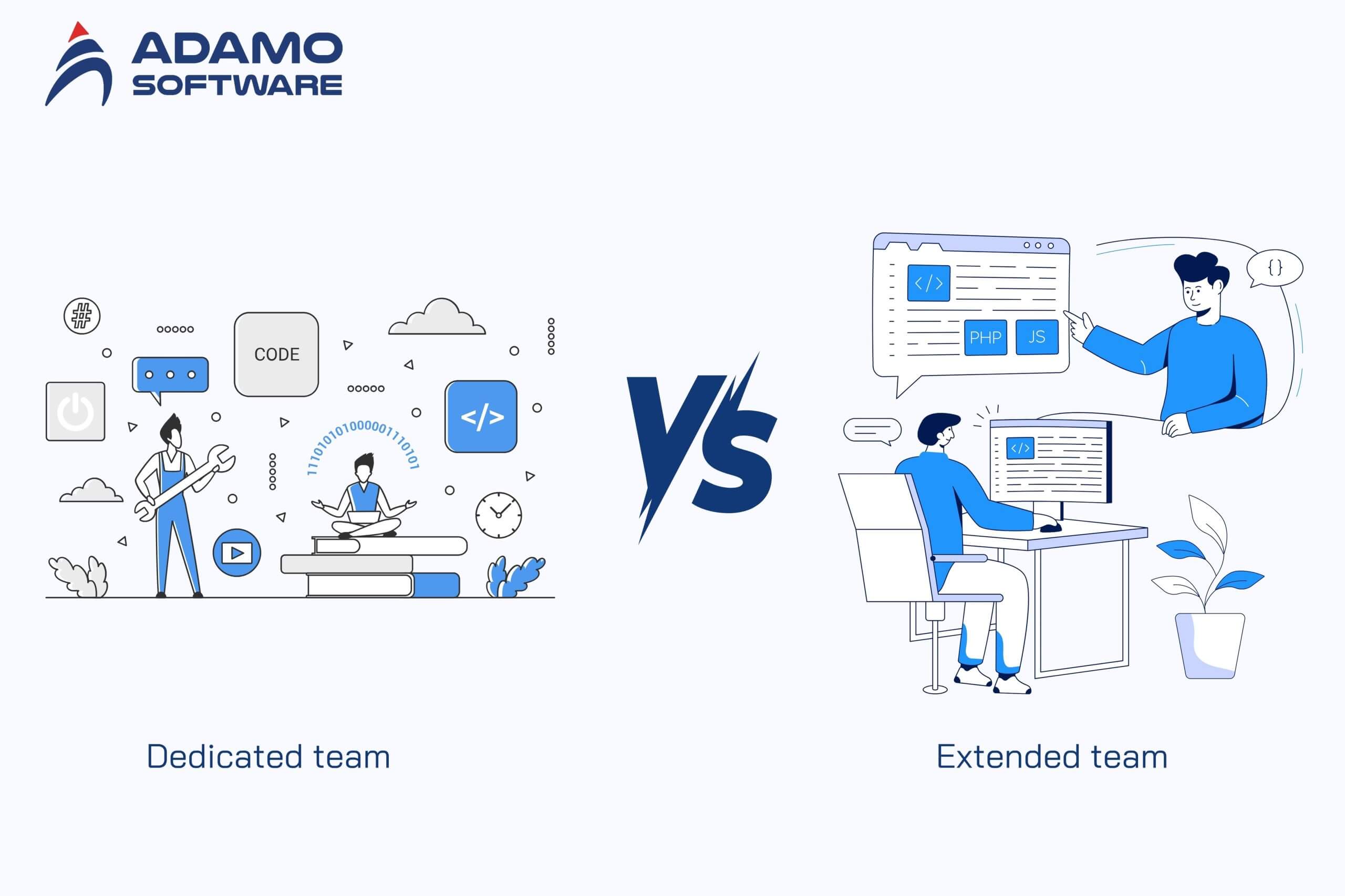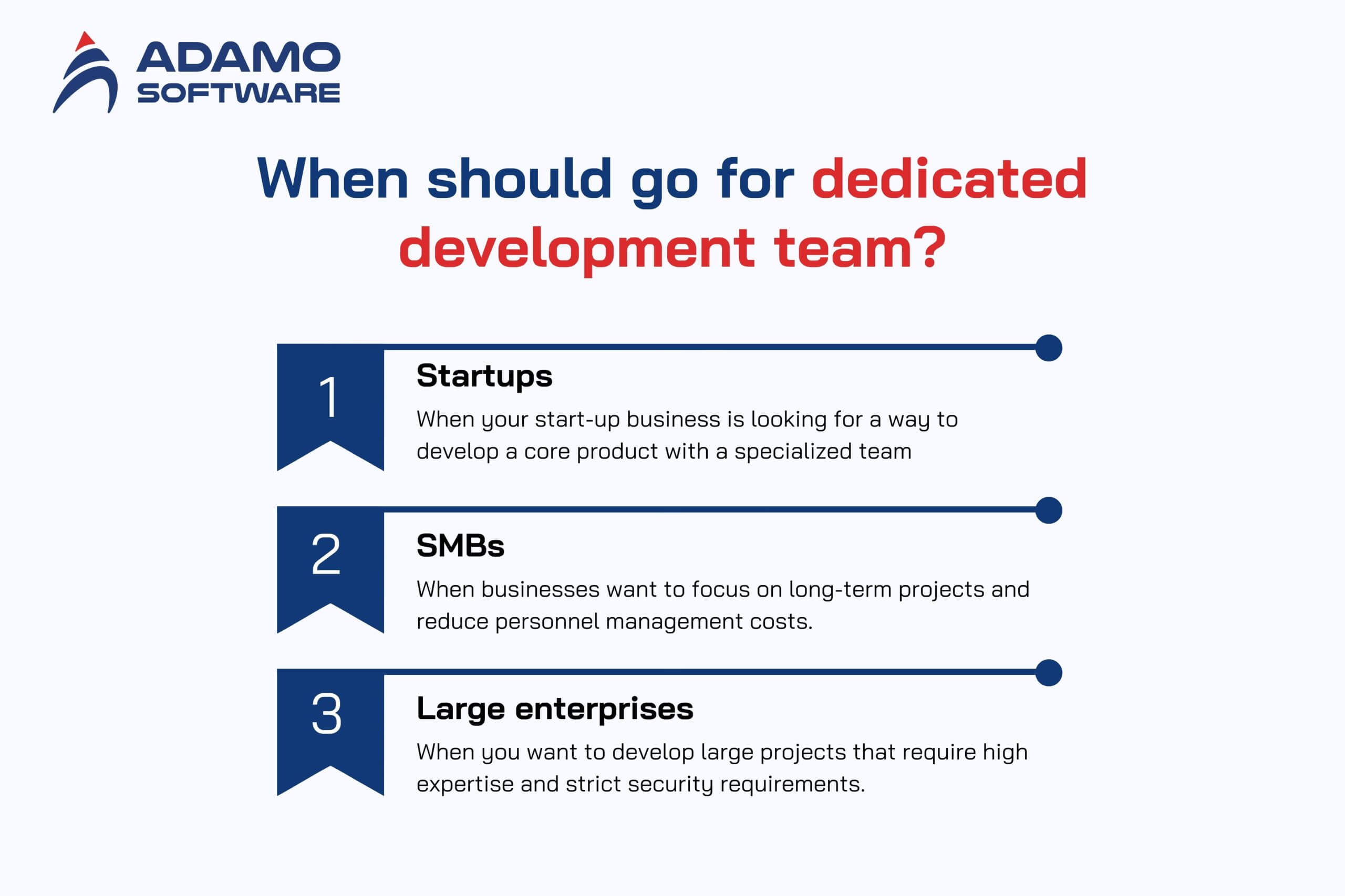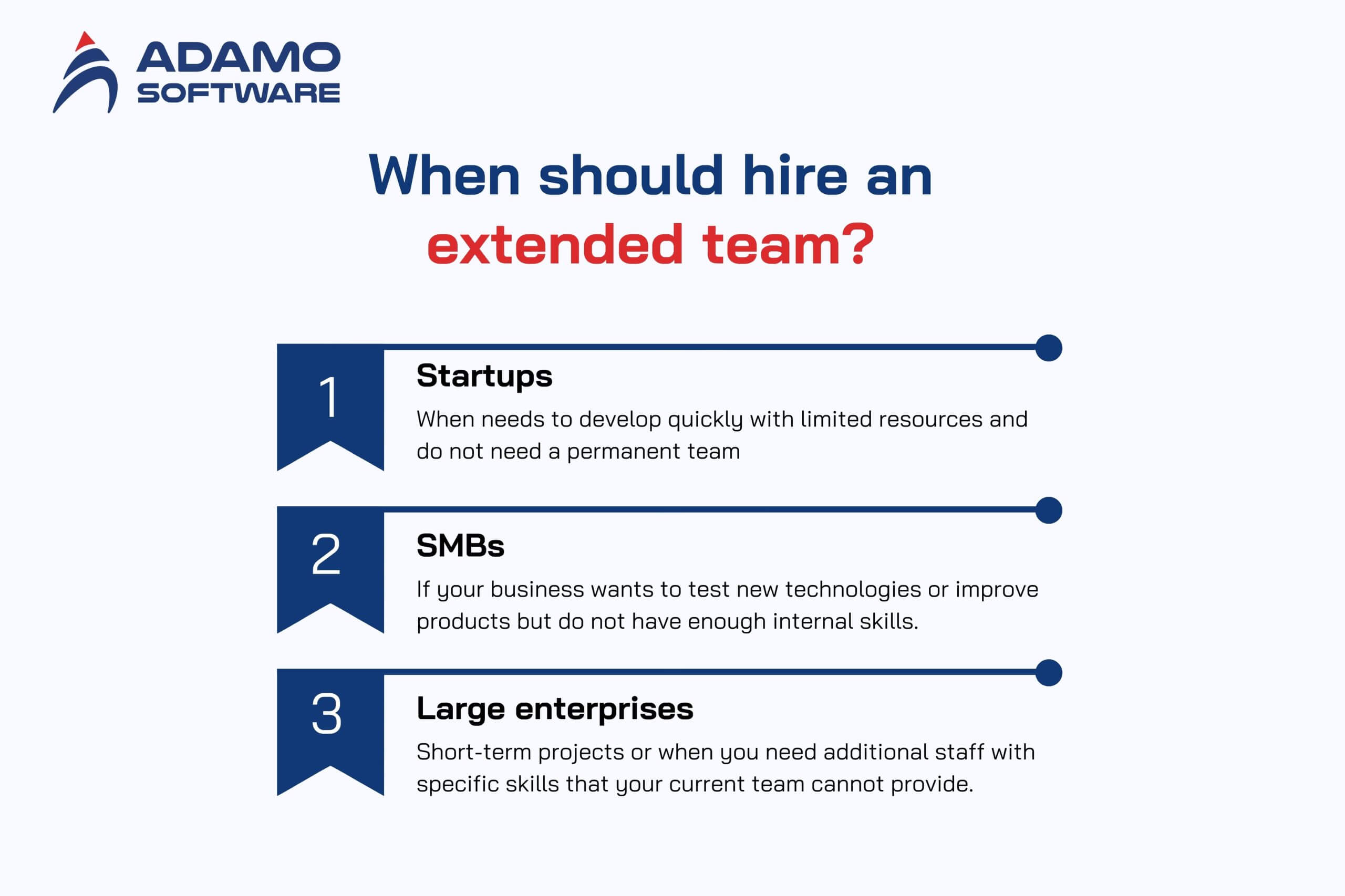Dedicated team vs Extended team: A guide to opting for the best fit

In the age of digital technology, the need for outsourcing IT is increasing as recruiting a permanent in-house team that can meet all the company’s requirements in every project is very difficult. However, when outsourcing an IT team from outside, businesses must consider choosing between a dedicated or extended team. Each option has its advantages and disadvantages, depending on the requirements and project scale of the firm. So, dedicated team vs extended team comparison, what are the differences? Let Adamo Software answer this question.
Through this blog post, you will have an overview of a dedicated team and an extended team and their differences. Besides, you will also know when to opt for each type of team; thereby choosing the best solution for your business. All information has been thoroughly researched and updated to the latest trends. So, let’s read our blog post and find some useful information for you.
I. Dedicated team vs Extended team: Understand the basics
Both dedicated teams and extended teams are beneficial to businesses in their ways. While a dedicated team usually works full-time and is committed to working with the business for a project in the long term, an extended team is more flexible and can add specialized skills without having to set up a new team from scratch. Dedicated team vs extended team comparison, let Adamo Software give you an overview of each type of team.

1. Overview of a dedicated team
A dedicated team is a team of outsourcing experts with exceptional expertise that a business hires to work on a project that requires qualified personnel. They are responsible for various IT tasks and provide expertise that the company may not have available internally. Considering the dedicated team vs extended team comparison, the dedicated team is especially suitable for long-term projects and requires a long-term commitment from the development team.
Advantages:
- Diverse experts from different fields: Businesses build an IT-dedicated team following their requirements. They include system management, cybersecurity, software development, cloud services, etc. Thanks to this flexibility, businesses can adjust the number of personnel needed based on each stage of development or project.
- Control operation: When working with a dedicated team, businesses can control the resources, development process, time, and budget completely. This is extremely essential in large projects that require constant adjustments and in-depth involvement of experts during implementation time. Businesses must consider this when comparing dedicated team vs extended team with each other.
- Flexibility: One of the great advantages of an IT-dedicated team is its ability to flexibly adapt to business growth or changes in technological needs. Businesses can expand or reduce the scale of services quickly and effectively. This flexibility helps to reduce costs and enhance project efficiency. This is also an important factor when making a dedicated team vs extended team comparison.
2. Overview of an extended team
When a business uses an extended team, it expands its in-house team by adding outside experts to support projects. Unlike the dedicated team, the extended team does not require long-term commitments and is often focused on increasing staff with the skills needed for each stage of development. When considering the dedicated team vs extended team comparison, the extended team is suitable for projects that need to accelerate implementation or require additional expertise without building a complete in-house team.
Advantages:
- Flexibility: An extended team provides flexibility as businesses can add any essential skills for the project without direct recruitment. The extended team can add or reduce the number of staff as required, ensuring the optimization of costs and time. This is a clear advantage when comparing dedicated team vs extended team.
- Costs: While an in-house team requires many fixed costs, the costs for an extended team are often lower. Businesses only pay for the necessary services, thereby saving budget while still meeting the project’s technical requirements.
- Advanced experts: When businesses need advanced technology experts or skills that the internal team does not have, they may use an extended team. This helps speed up project progress without having to invest time and money in internal training, which is an important factor when evaluating dedicated team vs extended team.
II. What are the differences between a dedicated team and an extended team?
For businesses working in the software development field, selecting the right collaboration team model can increase the success of the project. Dedicated team vs extended team are two popular models that businesses often consider. Although both of them provide human resources solutions, they are different in commitment, cost, and approach. Let’s explore the differences between a dedicated team and an extended team with Adamo Software!
Below is a summary comparison table between dedicated team vs extended team.
| Criteria | Dedicated team | Extended team |
| Commitment and time | Full-time commitment, long-term projects | Flexible, hired for short-term projects or certain periods of the projects |
| Control and management rights | Direct control and management from businesses, work like an in-house team | Service providers are responsible for managing the team, businesses participate when needed |
| Costs | Higher, including fixed salary and other related costs | More optimized, businesses pay only for necessary services |
| Ability to add skills | A long-term working team but less flexibility in adding immediate skills | More flexibility, easy to add necessary experts
|
| Suitable for | Complex projects, requiring high expertise and long-term commitment | Short-term projects requiring rapid staffing or skills augmentation |
Let’s consider each criterion in more detail.
1. Commitment and time
Commitment and time are among the important differences when comparing dedicated team vs extended team. Dedicated teams are typically hired to work full-time with businesses in the long term and are deeply committed to the project from start to finish. There will be a specialized team working throughout the project, even for years if the project is continuous and expanding. With long-term commitment, the team can understand clearly the businesses’ requirements, goals, and standards, thereby improving product quality and maintaining consistency throughout the entire development process.
Besides, the commitment also enhances consistency across development stages and motivates the team to continue improving the product based on feedback and changing needs. This is a deciding factor that many businesses prioritize when choosing between dedicated team vs extended team, especially for complex projects that require a team with the ability to grasp details and master the process.
On the other hand, the extended team is typically more flexible without long-term commitment. They are hired only when needed, often for short-term project phases or to supplement the expertise that the business’s existing team does not have. When your business wants to increase staffing in a short period of time without a long-term commitment to finance and human resources, an extended team is an ideal choice. This saves costs and reduces management constraints but may not provide the stability and consistency of a dedicated team.
2. Control and management rights
Like commitment and time, control and management rights are also essential criteria when comparing dedicated team vs extended team. If you choose the dedicated team, you will have the right to complete control over your team’s activities and workflows. A dedicated team acts as an extension of the organization, allowing you to directly manage everything from planning, assigning work to monitoring performance and making strategic decisions. This brings consistency to the development process and makes it easier for you to align projects with long-term goals.
Thanks to this control, businesses can maintain and develop organizational culture within the team. The dedicated team members often work closely with the existing in-house team, participate in meetings and exchange information regularly. This helps to build cohesion, create a close collaborative environment, and ensure that the team implements the project according to the standards and values that the business desires.
When comparing dedicated team vs extended team, dedicated team stands out with its ability to closely control, helping businesses easily respond to requirements and changes that arise during the development process.
In contrast, an extended team typically operates under the management of a service provider or third party. The level of control the business has is typically limited to essential requirements and periodic communication. Through the extended team model, businesses can reduce the time and resources spent on management, as the service provider typically takes on key management and support activities. reduce the time and resources spent on management, as the service provider typically takes on key management and support activities.
One of the outstanding differences between dedicated team vs extended team is the ability to adapt to changes. A dedicated team may be more flexible in adjusting the solution for the project when there are any new requests from your business. If you use an extended team, this process may be more complex as the team has to follow the third party’s guide. Thus, if your business wants to complete control and closely manage every detail of the project, a dedicated Team is the optimal choice. On the contrary, an extended team is suitable when a business wants to focus on the result without having to deeply intervene in the daily process.
3. Costs and financial efficiency
When comparing dedicated team vs extended team, costs and financial efficiency are also key factors. Each model has a different cost structure and financial efficiency, meeting different needs and diverse project scale of businesses.
With a dedicated team, the cost is usually higher as businesses must pay a fixed salary for the whole team. This also includes operating costs, benefits, and other related costs for long-term human resources maintenance. This team usually works on a project from the beginning to the end as internal staff. Therefore, businesses must prepare a stable budget to maintain the resources.
Although the costs are fairly high, this model is effective for large or long-term projects where the business needs a specialized team with a deep understanding of the project requirements. A dedicated team can ensure consistency, stability, and quality throughout the project development period.
Conversely, an extended team is an optimal choice option for short-term projects or when businesses only need to add human resources for a specific period without wanting to commit to a long-term commitment. With this model, businesses only pay for the services and the number of employees that are actually needed. Thanks to this, your business can optimize the costs without being financially constrained after the project is completed.
An extended team is exceptionally useful when your business needs to add certain specialized skills without having to pay for a permanent, full-time team. This is a clear advantage when choosing between dedicated team vs extended team, especially when businesses want to control their budgets closely. Besides, the extended team’s flexibility in expanding or reducing the number of employees helps businesses save costs and ensure that budgets are allocated at the right time, in the right place, and to precisely meet project requirements.
4. Ability to add skills
When comparing dedicated team vs Extended team, the ability to complement each model’s skills and expertise is a key factor, especially for projects that require multiple areas of expertise or require flexible staffing changes at each stage. When using the dedicated team model, your business will have a long-term specialized team that is familiar with the specific requirements and details of the project. This helps build a synchronization of knowledge and working style, thereby improving overall performance and creating consistency.
However, a dedicated team is often less flexible in adding specialized skills immediately. When there is a new requirement or a need to add another area of expertise, businesses may have to invest time and money to train or recruit additional members for the dedicated team.
In contrast, an extended team offers much more flexibility in adding skills. With this model, your business can quickly hire experts with specific skills in a short time, meeting immediate requirements without additional training. When projects require personnel with skills such as developing new technologies, managing complex data, or designing special interfaces, an extended team enables your business to add the right specialized members immediately. This is among the differences between dedicated team vs extended team.
Overall, the differences between dedicated team vs extended team revolves around commitment, cost, and control. While a dedicated team is suitable for long-term projects that require high expertise and full-time commitment, an extended team is flexible and cost-effective for short-term projects. Therefore, you should carefully consider project and financial needs to choose the right model.
III. When should go for a dedicated development team?
Choosing between dedicated team vs extended team depends on the projects’ characteristics and the businesses’ specific types and needs. A dedicated team can be beneficial for start-ups, small and medium-sized businesses, and large enterprises with unique needs and characteristics. Let’s see when each type of business should use a dedicated development team.

1. Startups
Start-up companies often face challenges with resources and time when developing new products. When your start-up business is looking for a way to develop a core product with a specialized team, a dedicated team model is an ideal choice. With this team, you can focus on the main goal of creating a product at the fastest speed and highest quality. The development team will be responsible for the entire process from design and development, to testing and deployment. The consistency of a dedicated team helps you quickly realize your ideas without interruption due to personnel changes or lack of expertise.
2. Small and medium-sized businesses (SMBs)
When comparing dedicated team vs extended team, the dedicated team is especially beneficial when businesses want to focus on long-term projects and reduce personnel management costs. Small and medium-sized businesses (SMBs) often must consider costs and resources carefully, especially when faced with projects that require high technology. When they want to achieve optimal performance without having to hire or train new employees and ensure consistency in workflow, the dedicated team is useful.
With a dedicated team, SMBs can maintain tight control without having to manage all day-to-day details, thereby reducing management pressure. This is especially useful when a business has a specific product development project or needs long-term cooperation but does not want to expand the internal team.
3. Large enterprises
Dedicated team vs extended team, both of them can be beneficial to large businesses. However, when you want to develop large projects that require high expertise and strict security requirements. A dedicated team allows you to implement complex projects without affecting other departments of the firm. Besides, with a dedicated team, large businesses can maintain tight control while easily adapting to changing project needs. This model helps businesses maintain flexibility without decreasing the quality or speed of project implementation.
Overall, when comparing dedicated team vs extended team, the dedicated team is the best choice for startups who want to focus on products, small and medium-sized businesses who want to optimize resources, and large businesses that need to ensure quality and consistency for large projects.
IV. When should hire an extended team
As mentioned, choosing between dedicated team vs extended team depends on the needs of the businesses. An extended team will be an ideal choice for companies that need to add flexible and specialized staff in the short term without long-term commitments. Let’s see when each type of business should hire an extended team.

1. Startups
When comparing dedicated team vs extended team, an extended Team offers a big advantage for startups that need to develop quickly with limited resources and do not need a permanent team. Startups often work with limited budgets and sometimes cannot invest in a full-time team for all stages of development. An extended team is the optimal choice for startups that need additional staff for short-term projects or specific stages such as testing, deployment, or new feature development.
With an extended team, startups can take advantage of outside expertise without long-term commitments or heavy investment in recruitment costs. This allows them to quickly respond to changing requirements while keeping costs under control.
2. SMBs
When making dedicated team vs extended team comparison, an extended team will help organizations meet short-term needs and optimize budget for specific projects by hiring experts only when needed, especially during peak project phases. This provides high flexibility, allowing businesses to easily increase or decrease staff without long-term commitment. If your business wants to test new technologies or improve products but do not have enough internal skills, an extended team is also suitable.
With a specialized external team, SMBs can improve product quality and keep up with technology trends without having to invest all resources in recruiting and training new staff. This is ideal for projects that need a core team to maintain long-term consistency, while also being able to expand with temporary staff when needed. This combination allows you to take advantage of both the stability and flexibility of both types of teams.
3. Large enterprises
When comparing dedicated team vs extended team for large enterprises, an extended team allows them to maintain flexibility in managing personnel and easily adapt to rapidly changing projects without affecting the internal team. An extended team is ideal for short-term projects or when you need additional staff with specific skills that your current team cannot provide.
With an extended team model, you can easily scale projects without the long-term costs of a full-time team. This is especially important during ramp-up phases such as testing, integration, or troubleshooting when you need additional highly skilled staff.
In general, an extended team is the right choice for startups that need flexibility and cost savings, small and medium-sized enterprises that need specialized resources for short-term projects, and large enterprises that want to add temporary human resources without long-term commitment. When you compare between dedicated team vs extended team, you will see that an extended team can offer optimal flexibility and savings for temporary or special-requirement projects.
Also read: Outstaffing vs outsourcing: What is better for your business?
V. How to choose your best fit with Adamo Software
With extensive experience and a team of professional experts, Adamo Software can help you choose your best fit between dedicated team vs extended team. No matter if your business is a startup, SMB, or large enterprise, Adamo can be your trusted partner. Here’s how Adamo Software can help you.

- Specialized and experienced team: Adamo provides a dedicated team, helping businesses focus on long-term projects, ensuring quality and progress with extensive industry knowledge.
- Flexible and customizable resources: With the extended team model, Adamo supports you to add human resources for short-term stages, quickly respond to changing requirements and save management costs.
- Optimized and highly secure process: Ensure all solutions are properly designed, secure data and meet high quality standards.
Still hesitating whether to choose Adamo Software? Let’s contact our team and we will answer all your questions.
FAQs
1. Can I hire both dedicated team vs extended team for one project?
Yes, you can. This is ideal for long-term projects that need a core team to maintain project consistency, while also being able to expand with temporary staff when necessary. This combination allows you to take advantage of both the stability and flexibility of both types of teams.
2. What is the specific cost for each type of team?
Comparing the cost of hiring dedicated team vs extended team, a dedicated team costs more because it is a team that has been committed to the project for a long time and acts as an internal employee. The cost for a dedicated team can range from $1000 to $5000 while this number is from $70 to $1000 for a dedicated team. The specific number depends on each project. Contact Adamo Software for detailed advice.
3. Can I switch between the two types of teams?
Yes, you can switch from Dedicated Team to Extended Team and vice versa, depending on the project’s needs. The conversion will help you optimize resources and costs at each project stage.





